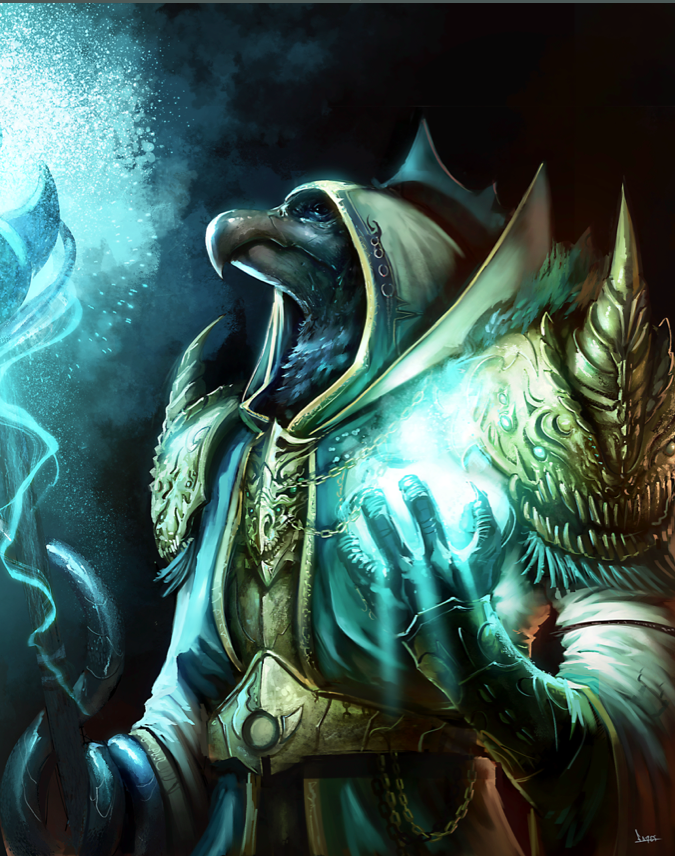Ninurta
Ninurta (a.k.a. Father of the Ozwok)
Not much is known of this war hero outside of what is recounted in a number of highly recited ozwok epics. His actions during these epics have cemented his near deification to the ozwok people and he is widely regarded in these tales as the progenitor of the ozwok race as a whole.
Mental characteristics
Personal history
After millennia spent as conduit for the Aether Omphalos, Ninurta was discovered by the Survivors of the Sparrowhawk after being ejected from the structure and a harrowing fight with a former colleague. The once great Ari folk hero suffered greatly from cognitive decline following his isolation, over-stimulation from the omphalos, and an unnaturally extended existence. His form was heavily atrophied and required placement back into the crystal omphalos just to stabilize his condition. Ninurta only shared a few parting words with Gromlock and one of his distant descendants. He revealed himself to be the 'Time Elemental' that was guiding them through the Epitome.
Folk Hero Myth
The following entry is a paraphrased version of the Ninurtine epic or 'Epic of Ninurta" from one of Weis the Wyld's many writings during his time in the Ari Badlands:One epic popular in Keather speaks of their folk hero Ninurta of the ancients. Ninurta was a great tracker in the badlands that came back to Kitsch one day to see that his people were succumbing to an unknown plague. The houses of the folk in Kitsch were closed and locked in fear of the disease. Ninurta, whose parents had also succumbed to this plague, called into the night with a roar pleading with the folk of Kitsch to trust each other and dig a great moat the keep the plague away. His people were too shaken to listen. He visited the elder of Kitsch, also stricken, that the plague could be cured by defeating the great warlords beyond the sands. Bent on honoring his people, Ninurta steeled himself and braved the western sands.
His journey west would lead him to many strange places and battle many great beasts: the deep imps, the featherless spearmen, the seabreathers, the warrior dragon and the chiefly baphomet. Only this great goatman bested him and had him cornered at a massive lake. Accepting defeat, Ninurta began to dig his own grave when he unearthed an ancient mace: a great morning star with teeth of water. Its touch filled him with life and he raced back to his people only to find all had succumbed to this plague. Pursued by the victor baphomet, whose horns size were rivaled only by that of his armies, challenged Ninurta to a final duel to the death. Stricken by grief that even his mace could not cure, our hero obliged with a request: pleading for a single day to bury the people of Kitsch.
Most of the day was spent digging a mass grave with all the energy he could muster. His mace consoled and pleaded with him to honor his family by sharing their burden; only then could he truly honor his fallen. Thus, he began to consume the fallen. Not only did he not fall ill, but was rejuvenated with a newfound strength. Ninurta cast away his shovel and began to consume all throughout the night fastening the bones of his kin into armor. Keeping the elder's skull as a totem, he cast the remaining bones into the newly dug moat.
As morning rose, Ninurta ventured northwest to the Chief’s camp. The battle was fierce and personal; his bow ran dry, his sword grew dull, even his morning star began to falter. As the hoofed Chief reared back for the finishing blow on our hero, Ninurta's gaze wandered to a maiden prisoner in this camp whose eyes glowed amber and brilliant as the midday sun. He had forgotten his family and gazed down to his totem. Clutching it and his morning star in hand, he parried the killing blow with his family’s pride and returned the same to the chief’s head. Blood and water spewed from his mace ending the goatman's rule.
Our hero freed the maiden that had been taken captive. This maiden of the air agreed to wed Ninurta revealing she had buried that mace imbued with the gift of life. Her only condition was that her power of life was to be used to give back to the land and start anew where his people had failed. The couple furnished a great stone cauldron and cast the mace into its hull. An endless stream spewed from the overturned cauldron and filled the moat around Kitsch. A new community arose upon the chief's camp and was named after the maiden, Keather. Those born of their union became the Ozwok that rule the sands to this day.

Divine Classification
Folk Hero
Current Location
Species
Children
Gender
Male
Eyes
Haggard, Sapphire
Hair
White/Tan
Height
6'6
Ruled Locations
Remove these ads. Join the Worldbuilders Guild



Comments
Author's Notes
Ninurta is directly named/inspired by his Mesopotamian counterpart and the Lugal-e.